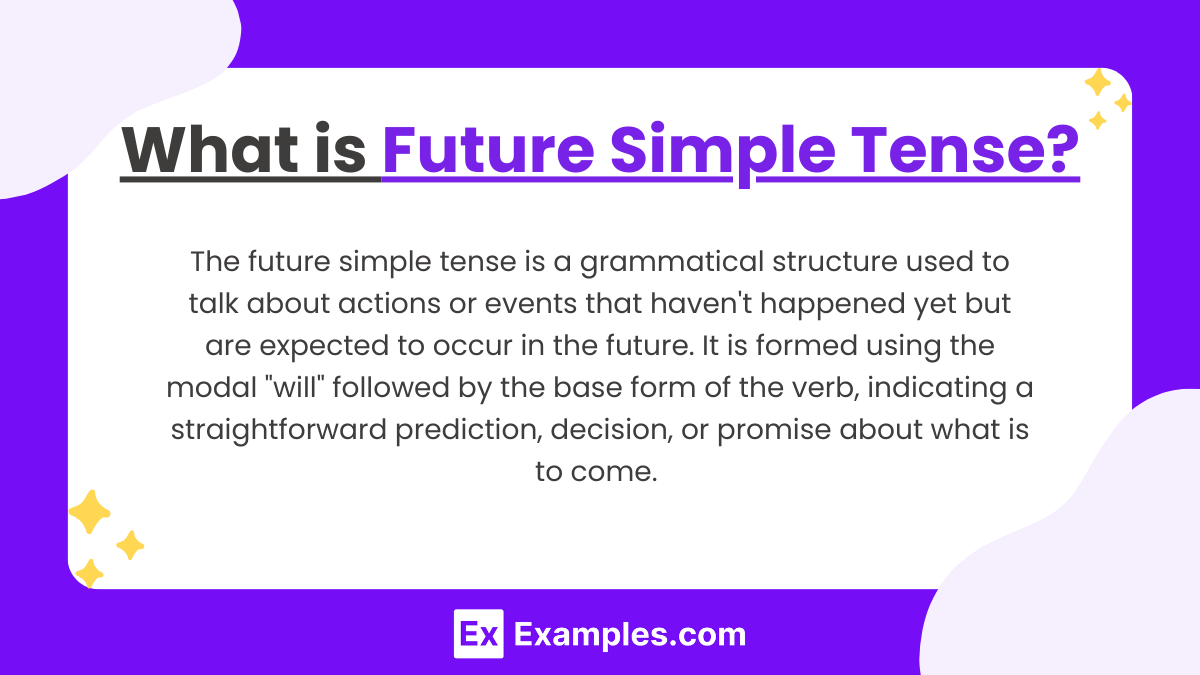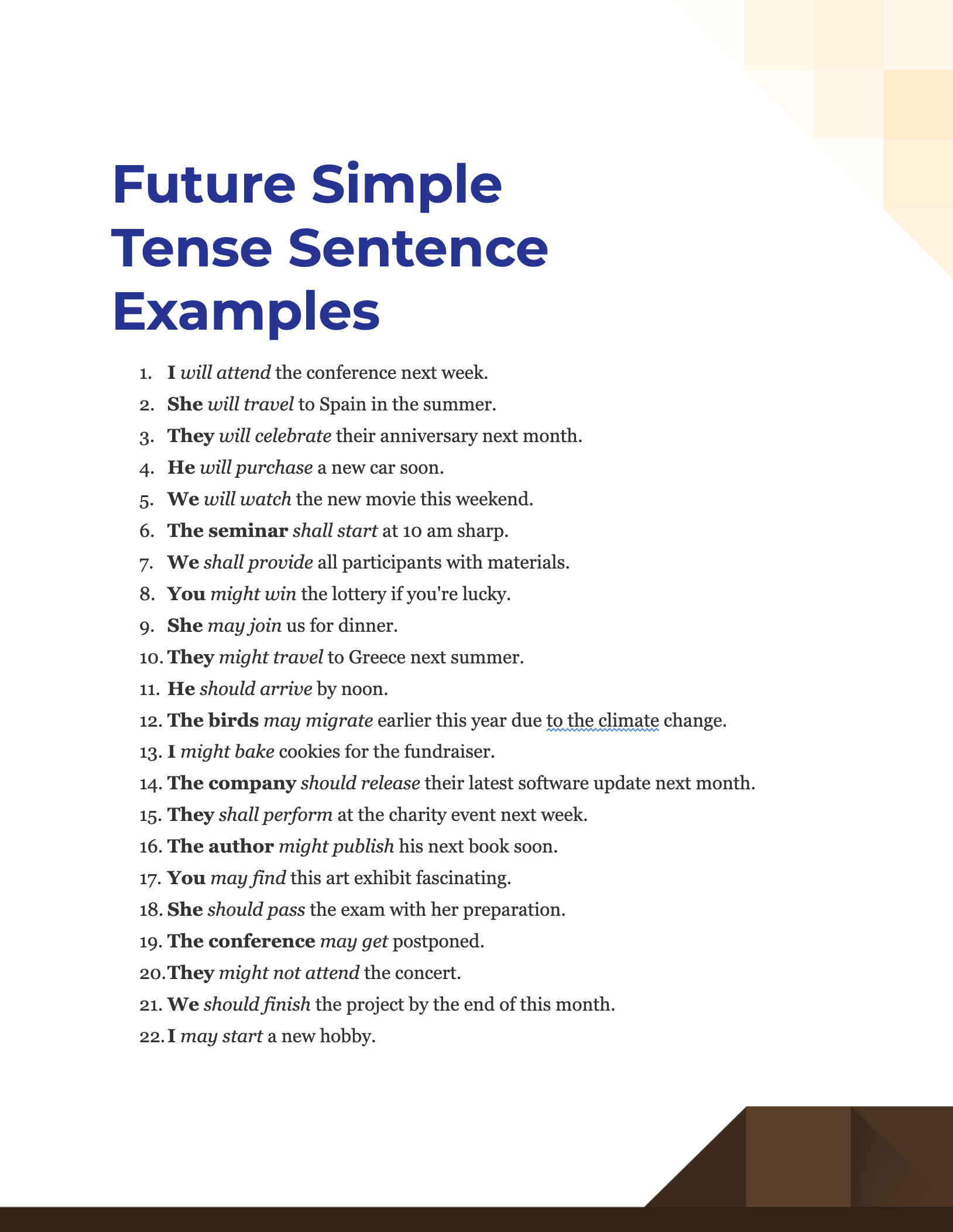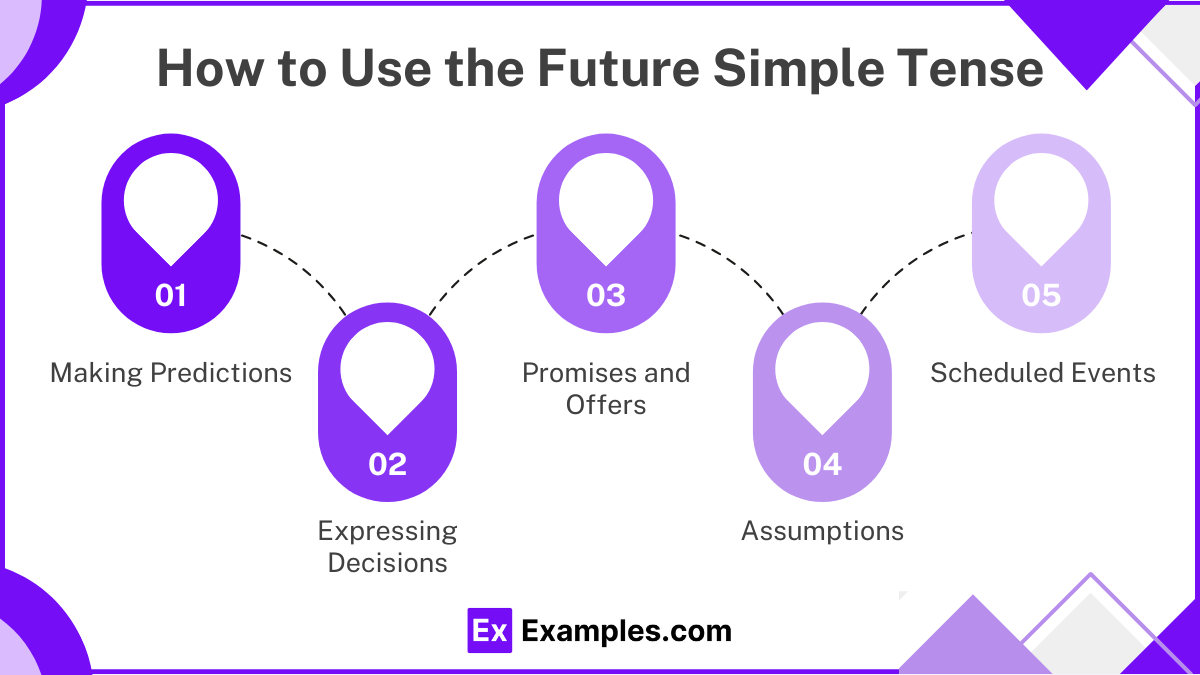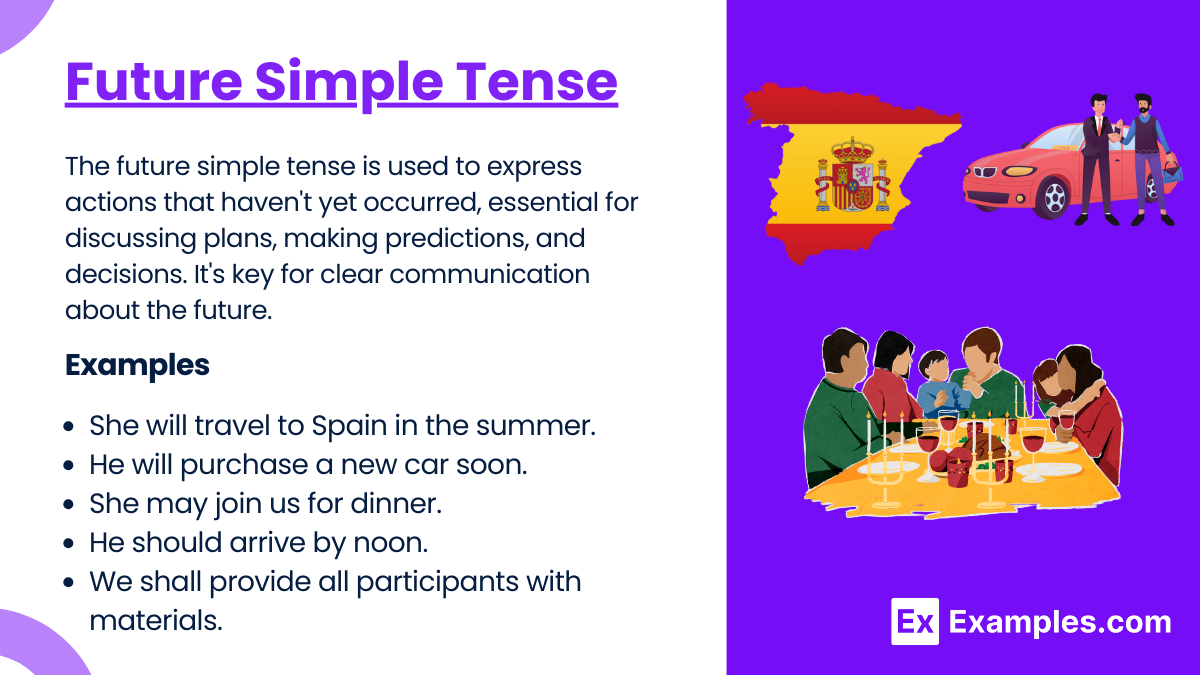99+ Future Simple Tense Examples
The future simple tense, often just called the future tense, is a grammatical structure used to express actions that have not yet occurred. It is straightforward to use and essential for everyday communication, helping us talk about plans, make predictions, and state decisions. Whether discussing upcoming events or imagining what might happen tomorrow, mastering the future simple tense is key to conveying time-related information clearly and effectively. This tense not only enriches our conversations but also enhances writing, providing a window into the possibilities that lie ahead.
What is Future Simple Tense?

What is the best Example of a Future Simple Tense Sentence?
A quintessential example of a Future Simple Tense sentence is: “I will visit Paris next summer.” This sentence epitomizes the essence of the tense as it clearly forecasts a future action (visiting Paris) that is anticipated to take place at a specific time in the future (next summer). The modal verb “will” paired with the base form of the verb “visit” delineates the future aspect of the action.
100 Future Simple Tense Sentence Examples

The Future Simple Tense is a portal that provides a glimpse into forthcoming events, aspirations, and promises. Serving as a storyteller of the days to come, it encapsulates intentions and predictions. Explore this handpicked compilation of 100 diverse sentences, with subjects accentuated in bold and verbs emphasized in italics, revealing the nuanced beauty and potential of this forward-looking tense.
- I will attend the conference next week.
- She will travel to Spain in the summer.
- They will celebrate their anniversary next month.
- He will purchase a new car soon.
- We will watch the new movie this weekend.
- The seminar shall start at 10 am sharp.
- We shall provide all participants with materials.
- You might win the lottery if you’re lucky.
- She may join us for dinner.
- They might travel to Greece next summer.
- He should arrive by noon.
- The birds may migrate earlier this year due to the climate change.
- I might bake cookies for the fundraiser.
- The company should release their latest software update next month.
- They shall perform at the charity event next week.
- The author might publish his next book soon.
- You may find this art exhibit fascinating.
- She should pass the exam with her preparation.
- The conference may get postponed.
- They might not attend the concert.
- We should finish the project by the end of this month.
- I may start a new hobby.
- He shall bring the necessary tools.
- She might not come to the party.
- Will the council approve the proposal?
- The movie should start in a few minutes.
- The plants may need more water in this heat.
- The organization might hold a press conference tomorrow.
- You shall receive all the benefits.
- I may enroll in a pottery class.
- She might consider the job offer.
- The ship shall dock at the harbor by dawn.
- He should give a response by tomorrow.
- They may not agree to the terms and conditions.
- Will the gardener plant roses in the garden?
- I might have an extra ticket for the game.
- The teacher shall announce the results after lunch.
- You may not recognize him after all these years.
- They might study abroad next year.
- He should propose during their vacation.
- The cat might climb the tree.
- We shall discuss the matter privately.
- You should check the expiration date.
- I may buy a new laptop during the sale.
- She shall deliver the keynote address.
- They might not complete the marathon.
- The manager should approve the budget.
- Will the chef prepare a vegan dish?
- I might move to a bigger city.
- She shall not tolerate any misconduct.
- The plane may land early.
- We should not underestimate the competition.
- He might not come due to his prior commitments.
- They shall uphold the tradition.
- Will the company expand its operations?
- She may adopt a pet from the shelter.
- The train might get delayed.
- You should apply sunscreen.
- I shall dedicate the book to my mentor.
- They may not support the new rule.
- The choir should rehearse before the performance.
- The dog might chase the ball.
- Will the meeting conclude by 5 pm?
- He shall not break his promise.
- I may attend the workshop next week.
- She should avoid caffeine.
- They might visit the museum during their trip.
- We shall not forsake our values.
- She may decline the invitation.
- Will the students submit their assignments on time?
- The orchestra should practice the symphony.
- You might consider taking a break.
- They shall not interrupt during the presentation.
- He may establish a new startup next year.
- The city might organize a carnival soon.
- Will the post office be open tomorrow?
- She should consider dietary changes for her health.
- I may donate to the charity fund.
- They might not understand the complexities involved.
- The committee shall review all applications.
- You should not worry about the results.
- The movie might release in multiple languages.
- He shall be responsible for the project.
- We may participate in the marathon next month.
- She should visit the historic sites.
- I might learn a new language.
- Will the chef introduce new dishes in the menu?
- The team shall not deviate from the plan.
- The river might overflow if it continues to rain.
- You should wear warm clothes in this cold.
- They might not receive the package today.
- The author shall sign copies of her new book.
- He may give a motivational talk at the school.
- I should finalize the itinerary for the trip.
- They might play in the championship final.
- She shall not ignore the advice.
- We may collaborate on a new project.
- Will the airline offer discounts during the festive season?
- He should enroll in the course for professional growth.
- The family might relocate for better opportunities.
Future Simple Tense Negative Examples
- I will not go to the party tomorrow.
- She will not finish her project by Friday.
- He will not attend the meeting next week.
- We will not travel to New York this summer.
- They will not participate in the competition.
- You will not need to bring any food.
- The store will not open until 10 AM.
- It will not rain tomorrow.
- Our team will not play in the finals.
- She will not buy a new car this year.
Future Simple Tense Interrogative Examples
- Will you go to the concert tonight?
- Will they join us for dinner?
- Will she accept the job offer?
- Will it snow tomorrow?
- Will we meet at the usual spot?
- Will he finish his homework on time?
- Will you buy a new house next year?
- Will she travel abroad this summer?
- Will they play the game tonight?
- Will it be ready by next week?
Future Simple Tense Active Voice Examples
- She will visit her grandparents next weekend.
- They will paint the house tomorrow.
- I will send the email tonight.
- He will drive us to the airport.
- We will celebrate our anniversary next month.
- You will understand the lesson after you study more.
- They will announce the results on Friday.
- I will make dinner for everyone.
- She will take the dog for a walk.
- He will fix the computer by tomorrow.
Future Simple Tense Passive Voice Examples
- The book will be read by the class.
- The car will be washed on Sunday.
- The project will be completed by next month.
- The message will be delivered by the courier.
- The new mall will be opened next year.
- The dinner will be prepared by my mother.
- The documents will be reviewed by the committee.
- The song will be sung by the choir.
- The building will be constructed by the end of the year.
- The agreement will be signed by both parties.
What is the Formula of Future Simple Tense Sentence?
The Future Simple Tense, often referred to as the “will” tense, is employed to depict actions or events that are anticipated to occur in the future. It’s a versatile tense that captures not just planned future actions but also quick decisions, promises, offers, and predictions. Understanding its formula is pivotal to grasping its usage correctly.
1. Affirmative Sentences:
The general formula for affirmative sentences is:
Subject + will + Base form of the verb + …
For example:
- He will travel to Italy next summer.
- They will complete the project by tomorrow.
2. Negative Sentences:
For negative sentences, “not” is added after “will.”
Subject + will + not + Base form of the verb + …
For instance:
- She will not attend the meeting.
- We will not watch the movie tonight.
3. Interrogative Sentences:
For questions, the sentence typically starts with “will.”
Will + Subject + Base form of the verb + …?
Examples include:
- Will he come to the party?
- Will they buy a new car?
4. Use of “Shall”:
In traditional grammar, “shall” is used with first person pronouns (I, We) to form the future tense, while “will” is used with all other persons. However, in modern English, especially in American English, “will” is more commonly used with all persons.
How to Use the Future Simple Tense

Making Predictions
Use the future simple tense to talk about events or actions you believe will happen in the future, e.g., “It will rain tomorrow.”
Expressing Decisions
Utilize this tense for decisions made at the moment of speaking, such as “I will go to the gym after work.”
Promises and Offers
It’s ideal for making promises or offers, for example, “I will help you with your homework.”
Assumptions
When assuming about the future based on present evidence, use this tense, like “She will be late; her meeting is running long.”
Scheduled Events
Although often formal or official, use it to denote scheduled future events, e.g., “The train will depart at 9 PM.”
How to Practice Future Simple Tense Sentences?
Practicing the Future Simple Tense ensures fluency and accuracy when predicting or speaking about future events. Here’s a guide on how to effectively practice:
Daily Journaling:
Initiate a habit of writing daily predictions or plans. Describe tomorrow’s weather, your plans, or world events you think will occur.
Role-playing:
Engage in conversations where you discuss future events. It can be a discussion about vacation plans, career goals, or world events.
Flashcards:
Use verb flashcards. Draw one and frame a Future Simple Tense sentence with it. For instance, for “dance,” you might say, “She will dance at the party.”
Interactive Apps:
Leverage language-learning apps. Many have dedicated exercises for practicing different tenses.
Storytelling:
Narrate a future event. For instance, detail a day in 2050 or describe a future trip.
Quizzes and Tests:
Regularly test your knowledge. Many online resources offer quizzes specifically for the Future Simple Tense.
Feedback:
Join language learning forums or groups and post your sentences, seeking feedback from more experienced learners or native speakers.
Tips for Using Future Simple Tense Sentences
1. Time Indicators:
Using words like “tomorrow,” “next week,” or “soon” can provide clarity.
2. Avoid Overuse:
While the Future Simple is versatile, ensure it’s the appropriate tense for your context. Don’t use it for habits or general truths.
3. Contractions:
In informal writing or speaking, “will” often contracts with the subject. For example, “I will” becomes “I’ll.”
4. Differentiating Between “Will” and “Shall”:
While “will” is universally accepted, “shall” is considered formal and is less common in modern American English.
5. Practice Makes Perfect:
Frequent practice, both written and spoken, will lead to mastery.
6. Mind the Negatives:
Remember that the negative form isn’t just about adding “not”; it also requires the base form of the verb.
7. Seek Real-Life Contexts:
Engage in conversations, write letters, or create scenarios where you’ll naturally use the Future Simple Tense.
FAQs
Can the Future Simple Tense be used for any subject?
Yes, the future simple tense works with any subject without changing the form of “will,” making it one of the simpler tenses to use.
Can the Future Simple Tense express uncertainty?
Yes, it often expresses assumptions or predictions about future events.
What are common mistakes to avoid when using the Future Simple Tense?
Common mistakes include adding extra endings to the verb, such as “I will goes,” instead of the correct “I will go.”
Is “shall” interchangeable with “will” in the Future Simple Tense?
“Shall” can be used interchangeably with “will” for first-person subjects (I and we) in formal or traditional contexts, but “will” is more commonly used.
Can the Future Simple Tense be used to make offers or promises?
Yes, the future simple tense is frequently used to make offers or promises, as in “I will help you with that.”



